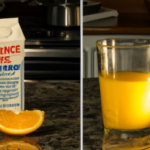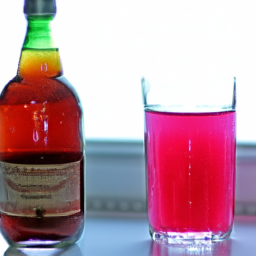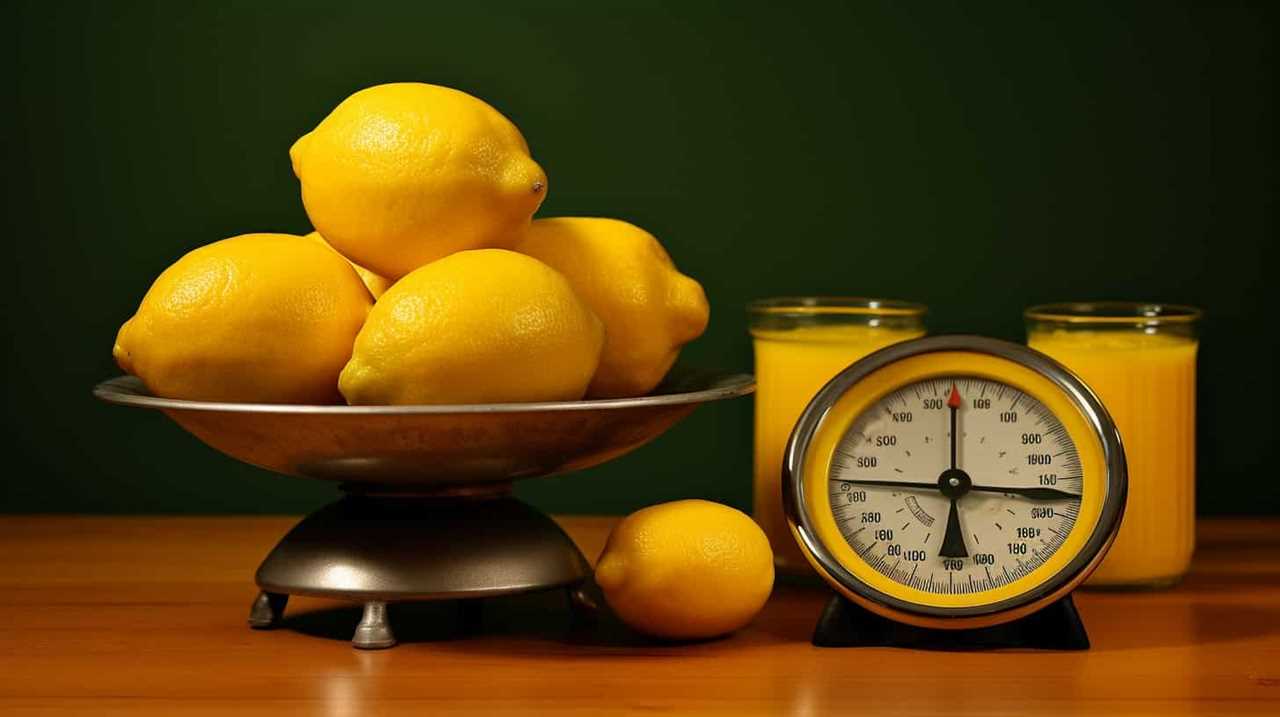As a lover of freshly squeezed orange juice, I often ponder how long it remains fresh. The last thing I desire is to consume juice that has spoiled and could potentially make me ill or taste unpleasant. Various factors influence the shelf life of fresh orange juice, such as storage conditions, processing methods, and packaging.
In this article, I will explore the science behind the shelf life of orange juice, how to tell if it has gone bad, and tips for extending its shelf life. When it comes to fresh orange juice, it is important to understand that it is a perishable product. This means that it has a limited shelf life, even when stored properly.
To ensure that you are drinking safe and fresh orange juice, it is crucial to know how long it stays good for. By understanding the science behind the shelf life of orange juice, you can make informed decisions about how to store it and how long you can keep it before it goes bad.
Key Takeaways
- Unopened orange juice lasts up to two weeks in the fridge.
- Freshly squeezed juice without preservatives has a shorter shelf life.
- Proper storage temperature is between 32°F to 40°F to prevent bacterial growth and foodborne illness.
- Exposure to light, heat, and air can degrade juice, leading to spoilage.
Understanding the Shelf Life of Orange Juice
So, how long’s fresh orange juice good for? Well, it all depends on how it’s stored and whether or not it’s been opened.
Unopened orange juice can last up to two weeks in the refrigerator, but once it’s opened, it should be consumed within three to five days. However, this can vary depending on the type of orange juice you have. For example, freshly squeezed orange juice that has no preservatives added will have a shorter shelf life than commercially produced orange juice that contains preservatives.
Juice expiration is determined by a variety of factors. Exposure to light, heat, and air can all contribute to the degradation of orange juice. Additionally, bacteria can grow in juice that has been left out at room temperature for too long.
Preservatives in juice can help to extend the shelf life, but they can also have negative health effects. It’s important to always check the expiration date on the packaging and to store your orange juice properly to ensure it stays fresh for as long as possible.
Speaking of freshness, let’s talk about how to tell if your orange juice has gone bad.
Signs That Your Orange Juice Has Gone Bad
You can tell if your orange juice has gone bad by noticing a sour smell and strange taste. These are the most obvious signs that the juice has been contaminated with common bacteria or other contaminants.
The longer the juice sits, the more likely it is to spoil. It’s important to note that drinking spoiled juice can pose health risks, including stomach discomfort, nausea, and vomiting.
To avoid these risks, it’s essential to know how to tell if juice has gone bad without tasting it. One way to do this is to check the expiration date on the bottle or carton. If the date has passed, it’s likely that the juice has gone bad.
Another way is to look for signs of spoilage, such as mold or discoloration. If there are any visible signs of spoilage, it’s best to throw the juice away. Additionally, if the juice has been left out at room temperature for an extended period, it’s likely that it has spoiled and should not be consumed.
Moving forward, it’s important to know how to store fresh orange juice properly to prevent it from going bad.
How to Store Fresh Orange Juice
When it comes to storing fresh orange juice, there are a few key things to keep in mind.
First, it’s important to store your juice at the proper temperature to prevent bacterial growth.
Second, choosing the right container is crucial to maintaining the freshness and quality of your juice.
And finally, if you want to freeze your orange juice for later use, there are a few tips you should follow to ensure that it stays in good condition.
Make sure to double new line after each complete sentence.
Use contractions where necessary.
Proper Temperature for Storage
To keep your fresh orange juice at its best, make sure it’s stored in the fridge at a temperature that’s colder than a polar bear’s toes. Ideal storage conditions for fresh orange juice involve maintaining a consistent temperature between 32°F to 40°F. This range is critical to preserving the quality and freshness of the juice.
Here are three reasons why temperature matters:
- Temperature impacts the rate of natural enzymatic reactions that can cause the juice to spoil.
- Storage at temperatures above 40°F can promote the growth of bacteria, leading to spoilage and potential foodborne illness.
- Exposure to temperature fluctuations can also affect the flavor and aroma of the juice, making it less appealing to drink.
Ensuring that your fridge is set to the right temperature is just the first step to keeping your fresh orange juice in top condition. Next, you’ll need to choose the right container to store it in.
Choosing the Right Container
Choosing the right container is crucial in maintaining the quality and taste of your beloved morning beverage. The best storage practices for fresh orange juice include selecting a container that is airtight, opaque, and made of a non-reactive material.
Airtight containers help prevent oxygen from reaching the juice, which can cause oxidation and spoilage. Opaque containers protect the juice from light that can degrade the quality and taste. Non-reactive materials such as glass, stainless steel, or plastic that is BPA-free, ensure that the container does not impart any unwanted flavors or chemicals into the juice.
When choosing a container, consider the capacity you will need and the amount of juice you will consume within a few days. It’s also recommended to choose a container that is easy to clean and store, as this will ensure that you can maintain the container’s cleanliness and prolong its lifespan.
By choosing the right container and following the best storage practices, you can enjoy fresh orange juice for up to 3-4 days.
Now, let’s move on to some tips for freezing orange juice.
Tips for Freezing Orange Juice
Now that we know how to choose the right container for storing fresh orange juice, let’s talk about freezing techniques. Freezing orange juice is an excellent way to extend its shelf life and preserve its flavor, but improper freezing techniques can lead to a loss of flavor, texture, and nutritional value.
To freeze orange juice properly, follow these three tips:
-
Choose the Right Container: Use a container that’s specifically designed for freezing liquids. Plastic containers with tight-fitting lids or glass jars with straight sides are good options.
-
Remove Air: Leave a small amount of space at the top of the container to allow for expansion during freezing. Then, cover the surface of the orange juice with plastic wrap before sealing the container to remove any excess air.
-
Label and Date: Always label and date the container before placing it in the freezer. This will help you keep track of how long the orange juice has been frozen.
By following these tips, you can ensure that your frozen orange juice retains its flavor and nutritional value. In the next section, we’ll discuss additional tips for extending the shelf life of fresh orange juice.
Tips for Extending the Shelf Life of Orange Juice
You can prolong the freshness of your orange juice by storing it in an airtight container in the fridge. But did you know that there are other ways to extend its shelf life? Here are some tips that can help you enjoy your orange juice for a longer period:
| Tip | Description | Effectiveness | |
|---|---|---|---|
| 1. | Store orange juice in glass containers | Glass containers are non-reactive and do not contain chemicals that can affect the taste and quality of the juice. | High |
| 2. | Keep the juice away from light and heat | Exposure to light and heat can cause the juice to spoil quickly. | High |
| 3. | Use a vacuum sealer | Vacuum sealing removes air from the container, which slows down the oxidation process. | High |
| 4. | Freeze the juice in ice cube trays | This is a great way to add flavor to smoothies or cocktails. | Medium |
By following these tips, you can ensure that your orange juice stays fresh for a longer period. But it’s also important to know why proper storage is crucial.
Importance of Properly Storing Orange Juice
Properly storing your orange juice is like giving it a cozy blanket, protecting it from the harsh elements that can cause it to deteriorate quickly. Here are some proper storage techniques that can help prevent spoilage:
-
Keep it chilled: Orange juice should be stored at a temperature of 35-40°F to prevent the growth of bacteria. This can be achieved by keeping it in the refrigerator.
-
Use an airtight container: An airtight container can help prevent oxygen exposure, which can cause the juice to spoil faster. Use a glass container or a plastic bottle with a tight-fitting lid.
-
Store in small portions: Orange juice should be consumed within a few days of opening the container. To prevent waste, store it in small portions that can be consumed in one go.
Properly storing your orange juice can help prevent spoilage and keep it fresh for longer. However, there are other factors to consider when trying to extend the shelf life of your juice.
Other Factors to Consider
To keep your morning beverage at its best, make sure to check the expiration date on the container before purchasing. However, other factors can also affect the quality of citrus juice, such as temperature, exposure to light, and the maturity of the fruit.
For example, citrus fruits that are overripe or have been stored for too long can produce juice that is too bitter or acidic. Additionally, exposure to light can cause the breakdown of certain nutrients in the juice, reducing its nutritional value.
Despite these factors, using fresh orange juice in cooking can provide numerous benefits. The natural sweetness and acidity of the juice can enhance the flavor of dishes, while the vitamin C and other nutrients can provide a boost of nutrition. From marinades to salad dressings, fresh orange juice can be a versatile ingredient in the kitchen.
With proper storage and use, you can enjoy the full benefits of fresh orange juice in your daily diet. As we move into the next section, we’ll explore the health benefits of drinking orange juice.
Health Benefits of Drinking Orange Juice
Sipping on a glass of OJ can give your body a much-needed boost of vitamin C, which acts as an antioxidant to fight off harmful free radicals.
In addition to vitamin C, orange juice also contains other essential nutrients such as potassium, folate, and thiamine. These nutrients play a crucial role in maintaining healthy blood pressure, red blood cell production, and nerve function.
The nutritional value of orange juice makes it an excellent addition to a balanced diet. However, it’s important to note that consuming too much orange juice can lead to an excessive intake of sugar and calories.
The recommended intake of orange juice is 8 ounces per day for adults. It’s also important to opt for fresh orange juice over processed options, as fresh juice retains more of the natural nutrients.
With that being said, there are alternatives to fresh orange juice that can provide similar health benefits.
Alternatives to Fresh Orange Juice
As someone who enjoys the health benefits of drinking orange juice, I’ve found that there are a variety of alternatives to fresh orange juice that can still provide similar benefits.
One option is store-bought orange juice, which can often be found with added vitamins and minerals.
Another option is to explore other fresh juice options, such as grapefruit or pomegranate juice.
Finally, homemade smoothies can be a great alternative, as they allow for the addition of various fruits and vegetables to create a custom blend of nutrients.
Store Bought Orange Juice
You should check the expiration date on your store-bought orange juice to ensure it’s still fresh. Store-bought orange juice can last up to two weeks in the refrigerator, but it’s important to check the expiration date as it may vary depending on the brand and packaging.
Some orange juices are sold in cartons, while others may be sold in plastic bottles. It’s also important to note that pricing comparison and nutritional value analysis may vary between different brands and types of store-bought orange juice.
When it comes to choosing store-bought orange juice, it’s important to consider your personal preferences and needs. Some brands may offer options for low sugar or high pulp orange juice, while others may have added vitamins or flavors.
However, it’s always important to check the expiration date and to properly store the orange juice to ensure its freshness. As for other fresh juices, there are many options available, and it may be beneficial to try a variety to find the best fit for you. Additionally, different types of juice may have varying shelf lives, so it’s essential to stay mindful of these to avoid consuming spoiled products. Keeping track of the orange juice expiration date is a simple yet crucial step in ensuring your juice remains safe and delicious. By maintaining proper storage practices, such as refrigeration and sealing the container tightly, you can extend the drink’s freshness and enjoy it for a longer period.
Other Fresh Juices
Now that we’ve discussed how long store-bought orange juice lasts, let’s delve into the world of fresh juice combinations and the best juicers.
Freshly squeezed juice is a great way to get your daily dose of vitamins and minerals. However, not all fruits and vegetables are created equal when it comes to juicing. Some produce more juice than others, and some require special preparation before being juiced.
The best juicers for extracting juice from fruits and vegetables are masticating juicers and centrifugal juicers. Masticating juicers are better at extracting juice from leafy greens, while centrifugal juicers are better at handling hard fruits and vegetables.
When it comes to juice combinations, the possibilities are endless. You can mix and match different fruits and vegetables to create delicious and nutritious juice blends. Some popular combinations include carrot and ginger, apple and kale, and beet and orange.
However, it’s important to keep in mind that some fruits and vegetables don’t mix well together. For example, citrus fruits and melons should be juiced separately because they have different digestion times.
Moving on to the next topic, homemade smoothies are a great way to incorporate more fruits and vegetables into your diet. But, how long do they last? Let’s find out.
Homemade Smoothies
Funny enough, blending your own smoothies at home doesn’t always result in a healthier alternative to store-bought options. Sure, you have control over the ingredients and can avoid added sugars and artificial flavors, but it’s easy to go overboard with high-calorie ingredients like peanut butter and full-fat yogurt. That being said, homemade smoothies can still be a nutritious and delicious option, especially when you use the right ingredients.
-
Stick to whole foods: Rather than loading up on protein powders and supplements, opt for whole foods like fresh fruits and vegetables. These provide essential vitamins, minerals, and fiber that your body needs to function properly.
-
Balance your macros: Make sure your smoothie includes a healthy balance of carbohydrates, protein, and fat. This will help keep you full and satisfied, and provide sustained energy throughout the day.
-
Experiment with flavors: Smoothie recipes are incredibly versatile, so don’t be afraid to try new flavor combinations. Adding herbs like mint or basil, or spices like cinnamon or ginger, can give your smoothie a unique twist.
When it comes to nutritional benefits, homemade smoothies can be an excellent source of vitamins, antioxidants, and fiber. Plus, they’re a convenient way to sneak in servings of fruits and vegetables that you might not otherwise eat.
So go ahead and experiment with different smoothie recipes, and reap the benefits of a healthy and delicious drink.
In the next section, we’ll explore some recipes for using up leftover orange juice.
Recipes for Using Up Leftover Orange Juice
Looking for creative ways to use up that leftover orange juice? Check out these delicious recipes! When it comes to cooking and baking with orange juice, the possibilities are endless.
From sweet to savory, there’s a recipe to suit every taste bud. One great way to use up leftover orange juice is to make orange juice cocktails. Simply mix the juice with your favorite liquor, add ice, and enjoy a refreshing beverage that’s perfect for any occasion.
Another great way to use up leftover orange juice is to create orange juice marinades. Marinades are a great way to add flavor and tenderize meat, poultry, or fish. To make a simple orange juice marinade, combine orange juice, olive oil, garlic, and your favorite herbs and spices.
Use this marinade to marinate your favorite protein for at least 30 minutes before cooking. The result is a juicy, flavorful dish that’s sure to impress.
So next time you find yourself with leftover orange juice, don’t let it go to waste. Try out these recipes and add some delicious orange flavor to your meals.
Frequently Asked Questions
Can you freeze fresh orange juice to extend its shelf life?
As a nutritionist, I recommend freezing fresh orange juice to extend its shelf life. The best freezing method is to pour the juice into an ice cube tray. This maintains the nutritional benefits, ensuring you have a fresh and healthy drink on hand whenever you need it.
Is it safe to drink orange juice that has been left out at room temperature overnight?
It is not safe to drink orange juice left out at room temperature overnight due to the potential for microbial growth. Proper refrigeration methods should be used to prevent bacterial contamination and ensure the safety of the juice.
How long does freshly squeezed orange juice last compared to store-bought orange juice?
Freshly squeezed orange juice is superior in taste and nutrition compared to store-bought. It contains higher levels of vitamin c and antioxidants. Homemade juice is fleeting, but its benefits are worth the effort.
Can you mix different types of citrus fruits to make juice, or should they be kept separate?
When mixing citrus fruits for juice, it’s best to keep them separate due to differences in flavor and nutritional benefits. For example, oranges contain more vitamin C than grapefruits. Mixing them dilutes these benefits and alters the taste.
What are some common additives in store-bought orange juice, and how do they affect its shelf life and nutritional value?
Additives commonly found in store-bought orange juice include preservatives, flavor enhancers, and vitamin fortifiers. These additives extend the juice’s shelf life, but may also decrease its nutritional quality.
Conclusion
In conclusion, understanding the shelf life of fresh orange juice is crucial in ensuring that you consume a healthy and safe product. While the juice is known for its numerous health benefits, it can quickly go bad if not stored correctly. Signs of spoilage include off smells, a change in color, and a sour taste.
To extend the shelf life of your orange juice, store it in a clean, airtight container in the refrigerator. However, despite all these precautions, there’s always a chance that your orange juice may not last as long as you’d like.
As such, it’s always essential to have a backup plan. Whether you decide to juice your own oranges or opt for other alternatives, such as frozen or canned juice, it’s vital to have a plan in place.
So, take care of your orange juice, and in turn, it’ll take care of you!
Cindy thoroughly researches juicing trends, techniques, and recipes to provide readers with practical advice and inspiration. Her writing style is accessible, engaging, and designed to make complex concepts easy to understand. Cindy’s dedication to promoting the advantages of juicing shines through her work, empowering readers to make positive changes in their lives through the simple act of juicing.

















